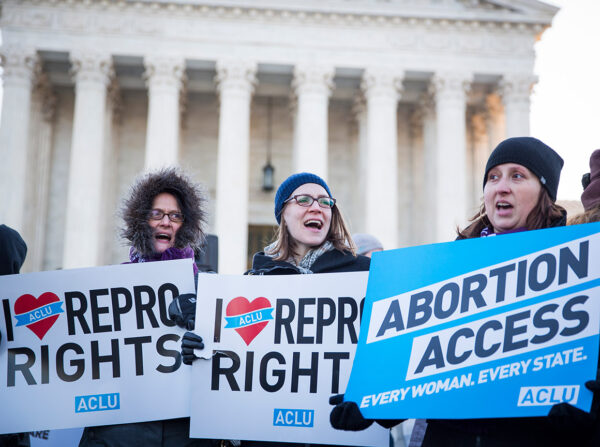ACLU and Planned Parenthood Go On Offense in Maine
Groups Challenge Law that Disregards Medical Experts and Burdens Patients by Blocking Qualified Clinicians from Providing Abortion Care
AUGUSTA, Maine — The American Civil Liberties Union, Planned Parenthood, and the ACLU of Maine today filed suit to challenge a Maine law that severely restricts access to abortion care in the medically underserved state. Maine is the most rural state in the country, with more than 60 percent of its population living outside of urban areas.
The federal lawsuit challenges a provision in Maine law that requires that abortions be performed solely by physicians and blocks qualified nurse practitioners and nurse-midwives (also known as advanced practice registered nurses, or APRNs) from doing so, despite their rigorous post-graduate training and extensive clinical experience.
Data, including from the Centers for Disease Control and Prevention, show that abortion has over a 99 percent safety record. Peer-reviewed medical literature – including a recent four-year study of more than 11,000 abortion patients published in the American Journal of Public Health – uniformly confirms that APRNs can safely and effectively provide this care early in pregnancy.
Citing these strong safety data, medical authorities ranging from the American College of Obstetricians and Gynecologists, to the American Public Health Association, to the World Health Organization, have all concluded that laws prohibiting APRNs from providing abortion services early in pregnancy are medically unfounded. In the neighboring states of New Hampshire and Vermont, APRNs have been safely providing abortion care for years.
Currently, APRNs in Maine provide a wide range of health services of equal or greater complexity than first-trimester abortion, including miscarriage management – which is identical to the procedure used for an early in-clinic abortion. Abortion is the only health service the state singles out as beyond an APRN’s scope of practice.
This law significantly restricts patient access to abortion services in Maine, and prevents some Maine women from receiving an abortion from their regular primary and gynecological care provider (who, in many cases, is an APRN). Today, while medication abortion is available via telemedicine in some cases, there are only three publicly accessible health centers in Maine where a woman can get an in-clinic abortion. If this medically unjustified restriction is blocked, that number will increase to at least 18 locations across this large, rural state.
Today, some women living in northern Maine have to make a more than six-hour round-trip to Bangor for an abortion, even though there is a qualified, experienced APRN in their community ready to provide this care. This law causes women to delay their abortion while they save money and arrange for transport, time off work, and child care – if they can access an abortion at all. These barriers are hardest on people who already face systemic barriers to health care, including people of color, people living in rural areas, young people, and people with low incomes.
This is the first federal physician-only abortion restriction court challenge since the landmark Supreme Court decision in Whole Woman’s Health v. Hellerstedt, which emphasized that states cannot burden patient access to abortion without proof of a valid medical justification.
Plaintiffs include four APRNs and two abortion providers in Maine: Julie Jenkins, Katie Riley, Alison Bates, Stephanie Small, Maine Family Planning, and Planned Parenthood of Northern New England. They are being represented by attorneys with the ACLU, the ACLU of Maine, and Planned Parenthood.
Experts had the following comments:
Julia Kaye, staff attorney with the ACLU Reproductive Freedom Project: “A woman who has decided to end her pregnancy should be able to get safe care from a qualified health care provider in her community, just like any other patient. Medically unjustified laws that single out abortion should never prevent qualified providers from serving their patients.”
Zachary Heiden, legal director of the ACLU of Maine: “Anyone who has made it through a Maine winter in a rural area knows that travel can be dangerous or impossible at times – it’s wrong to make a woman risk a journey of hundreds of miles to get an abortion when there are qualified providers nearby.”
George Hill, president and CEO of Maine Family Planning: “Nurse practitioners and nurse-midwives are highly qualified to provide the full range of reproductive health care, including abortion care. Thousands of Mainers choose these medical professionals to provide their reproductive health care, and requiring those patients to go elsewhere for a physician to end a pregnancy simply doesn’t make medical sense.”
Dr. Raegan McDonald-Moseley, chief medical officer of Planned Parenthood: “All of us want women to have access to safe medical care. Medical experts oppose outdated restrictions like this one because they don't help keep women safe, and aren't grounded in thorough research or the best science. We are in court on behalf of our patients, because everyone deserves the right to access safe, legal abortion.”
Nicole Clegg, vice president of public policy for Planned Parenthood of Northern New England: “What people outside Maine may not realize is how rural our state is, and how hard it can be to access health care. A person’s ability to make their own personal decisions about abortion shouldn’t depend on their zip code. “
More about this case can be found here: https://www.aclu.org/cases/jenkins-v-almy
The complaint can be found here: https://www.aclu.org/legal-document/jenkins-v-almy-complaint


